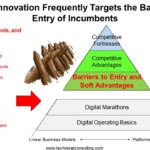In this Tech Strategy Podcast, we dissect Constellation Software’s remarkable investment strategy. Digital strategy consultant Jeffrey Towson reveals valuable lessons for investing in software businesses navigating the ever-evolving tech landscape.


In this Tech Strategy Podcast, we dissect Constellation Software’s remarkable investment strategy. Digital strategy consultant Jeffrey Towson reveals valuable lessons for investing in software businesses navigating the ever-evolving tech landscape.

In his insightful article, Jeffrey Towson outlines essential considerations for B2B tech strategy. He emphasizes the impact of digital transformation on businesses and highlights the unique role of a digital strategy consultant.

In this podcast, Jeffrey Towson, a leading tech strategy and digital transformation consultant, unpacks the playbook that fueled Depology’s meteoric rise. Learn how their innovative approach disrupted the beauty ecommerce landscape. From leveraging cutting-edge technologies to mastering customer engagement, Depology’s success story is a testament to the power of strategic thinking in the digital age.

In the latest episode of the Tech Strategy podcast, Jeffrey Towson delves into Microsoft’s use of bundles to launch Teams. And dethrone Slack. With Azure’s cloud services gaining market share and AI tools like Sales Copilot and GitHub Copilot driving productivity, Microsoft remains a tech powerhouse. As a digital strategy consultant, Towson highlights how Microsoft’s strategic moves are redefining the industry landscape.

In this podcast episode, Jeff Towson delves into the innovation strategy behind using GenAI and intelligence technology to create robust barriers to entry. As a leading digital transformation consultant, Jeff provides valuable insights on how businesses can leverage these advanced technologies to stay ahead. This episode is a must-listen for anyone seeking to refine their digital transformation strategy with guidance from a seasoned digital strategy consultant.

In this episode of the Tech Strategy Podcast, Jeff Towson explores the second step of his Generative AI Playbook, focusing on the critical aspects of tech strategy. He discusses the key elements that drive successful AI implementation and shares actionable insights for businesses looking to harness the power of generative AI. Tune in for a deep dive into how strategic planning can transform AI potentials into tangible outcomes.

In this episode of the Tech Strategy Podcast, Jeff Towson unpacks iQIYI’s playbook for tech-empowered entertainment. Discover how one of China’s top online video platforms is leveraging technology to reshape the entertainment landscape. Gain valuable insights into iQIYI’s strategies and what they mean for the future of digital media.

Jeff Towson shares his observations from visits to JD, iQIYI, and Huawei, highlighting the key strategies and insights from these encounters. He discusses how these companies are leveraging technology to drive growth and innovation. Towson also shares his own perspectives on the implications of these strategies for businesses and investors.

In this podcast episode, delve into the intricacies of Alibaba’s generative AI strategy, unraveling how the tech giant is revolutionizing e-commerce through innovative approaches. Explore the transformative potential of generative AI in reshaping consumer experiences and disrupting traditional business models. Join the conversation as industry experts dissect Alibaba’s forward-thinking initiatives and their implications for the future of online commerce.

In this episode of the Tech Strategy Podcast, Jeff Towson delves into the dynamic landscape of access vs. ownership businesses, highlighting how companies are reshaping consumer behavior and redefining market norms. From transportation to accommodation, the sharing economy has paved the way for disruptive innovators, challenging conventional ownership models and transforming industries at a rapid pace. Tune in to explore the strategies behind these disruptors and gain insights into the future of access-based business models.